Emmanuel Dungia
| Emmanuel Dungia | |
|---|---|
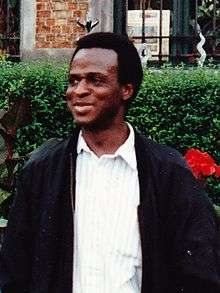 | |
| Born |
20 April 1948 Bondaki, Sud-Ubangi, Belgian Congo |
| Died |
February 1, 2006 Brussels, Belgium |
| Nationality |
|
| Other names |
Emmanuel Dungia Mosi Nagifi |
| Known for | |
Emmanuel Dungia (April 20, 1948 – February 1 2006) was a diplomat and politician of the Democratic Republic of Congo (DRC), author of the political book: Mobutu and the money of Zaïre: the revelations of a diplomat, former Secret Services agent (Mobutu et l’argent du Zaïre: les révélations d'un diplomate, ex-agent des Services secrets). The latter includes the report prepared for the International Monetary Fund by Erwin Blumenthal,[1] former Director of Foreign Affairs of the Bundesbank. Dungia was also imprisoned and eventually acquitted by the Congolese government for his alleged involvement in a plot to overthrow Laurent Kabila[2] who was assassinated January 16, 2001.
Early life
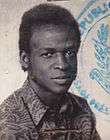
Emmanuel Dungia is the son of François Zoambe Kuku Dungia, a male nurse and Wivine Yumbe Mbisala, a housewife who had given birth to him in Bondaki, an area around Gemena in the region of Sud-Ubangi District in the province of the Équateur in the Democratic Republic of Congo.
Emmanuel Dungia was born Emmanuel Dedetemo. De de te mo translates literally into Ngbaka by doing to yourself. Figuratively, one interpretation would be: Take care of yourself without letting anyone influence you.
The name DUNGIA comes from NDUNGIA from which the "N" letter was removed in 1957 when changes to make Congolese surnames uniform and legal by the colonial authority according to official procedures. Ndungia exists in the Ngbaka tribe, but is not commonly used and its significance is unknown. The Belgian colonial authority proceedings will be overturned by colonial Mobutu from 1967 when he introduces the concept of authentic Congolese nationalism or authentic Zairian revolution which sole purpose will be to erase the colonial history of his country.
During his childhood and youth, Dungia passes either by choice or by circumstances through a number of academic institutions: the Catholic school of Molegbe (École catholique de Molegbe) where he learned the Ngbandi dialect, Kotakoli little seminar (le petit séminaire de Kotakoli), the Normal School of Molegbe (École normale de Molegbe), the Catholic school of Libenge (École catholique de Libenge), Saint-Lawrence College of Gemena (Collège Saint-Laurent de Gemena) which was the first founded high school since the beginning of the Colonisation of the Congo in the District of Ubangi, the former Royal Athenaeum of Coquilhatville (Athénée royal de Coquilhatville) which was reserved for Belgian children and évolués congolais before Congo’s independence, the Royal School of Cadets (École royale des cadets) in Brussels, Royal Military Academy of Belgium (École royale militaire belge),[3] the Athenaeum of Ngiri-Ngiri (Athénée de Ngiri-Ngiri) of Kinshasa and a school in the Neuf-Château city in the Belgian province of Luxembourg.
Career under Mobutu Sese Seko
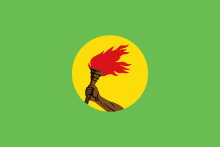

Intelligence services
In February 1978, Emmanuel Dungia leaves Belgium to return permanently to Zaïre where shortly after his return he is hired in the Finance administration department as an Inspector of Finance.
One day Dungia decides to make a courtesy visit to Zuwa Gozo, an elder and popular football player of the African community of Leuven where he had come to prepare a PhD in Maritime Law. Zuwa Gozo, serves as Private Secretary to Mr. Seti Yale,[4] at the time the powerful boss of Zairian security service. Zuwa Gozo’s boss Seti who knew Dungia for having met with him at the University of Lovanium (université Lovanium), noticing his presence, asked how he was doing and more especially about his studies when he entered his office to give instructions to Zuwa Gozo. The next day, Seti Yale had Dungia brought in to show him his university degree. Dungia comes in as requested and is hired on the spot by Seti. Dungia reported that later he will realize that Seti’s action might have been dictated by the need to collect some information on his rival Honoré Ngbanda[5] with whom he had rubbed shoulders closely in Brussels, his competitor in leadership around Mobutu.
After training in the Zairian intelligence services for a month, Dungia is first assigned as assistant, then as the head of security at the Ndjili International Airport. In 1979, he is transferred to the central management research department (service d’études à la direction centrale).
Diplomatic assignments in Europe
After some external work, Dungia is sent in diplomatic missions in Paris (1980–81), Brussels (1981–86) and the Vatican (1986–89). In 1989, he is recalled in Kinshasa where he works as a liaison security agent under the official title of diplomatic adviser to Foreign Minister Nguza Karl-I-Bond. But Dungia says that he no longer has heart to perform intelligence work. From 1986, he grows increasingly uncomfortable with Mobutu’s management system which he qualifies as “criminal”, hurting his conscience.
In April 1990, Mobutu’s political regime evolves into a Multi-party system. After the formation of the first government of transition, Minister’s Office of Nguza gives way to that of Mushobekwa Kalimba Wa Katana.[6] However, Dungia refuses to reinstate the security service as a result of the latter cabinet restructuring.
First exile and publications
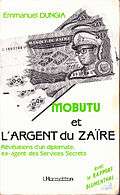

He is carefully preparing to go into exile in Belgium after having completed the manuscript of his book Mobutu et l’argent du Zaïre which goes on sale the 28th January 1992. The dictator Mobutu promotes it himself by assigning L’Harmattan the Publisher and Dungia in justice in an attempt to ban the book from publication. The book is an international success,[7] but its publisher would, according to Dungia, commit a major fraud at his expenses. He accuses the director of l’Harmattan, of systematically deceiving authors (especially Africans) on the number of works printed and sold. Mobutu et l’argent du Zaïre which continues to be sold to this day was then available in major university libraries worldwide. Dungia's book is continually referenced by other works and authors. Mobutu et l’argent du Zaïre had also been extensively used by participants of the Conference on National Sovereignty (Conférence nationale souveraine).
In 1995, Dungia lives under police protection of the Belgian State in trying conditions with his children. In September 1995 he accepts a job at a non-profit organization that deals with people with psychological problems, prisoners and aliens seeking a positive resolution of their immigration status in Belgium.
The same year, he publishes The tropical octopus. The instruments of Mobutu (La pieuvre tropicale. Les tentacules de Mobutu), a book which distribution and impact will be modest compared to his first book.
Career under Laurent-Desire Kabila
.svg.png)
Dungia joins the rebellion against Mobutu’s regime
At the end of September 1996, Mobutu’s political regime is facing an insurrection in the province of Kivu. A rebellion supported by Rwanda and Uganda conquers cities and advances ahead towards Kinshasa. After the fall of Kisangani on 15 March 1997, the businessman Jeannot Bemba Saolona and Ambassador Pelendo who assert to speak for the Ngbaka community, charge Dungia with the mission to deliver in Goma a message from the Ngbaka people to the leader of the rebellion Laurent Kabila. Dungia arrives in Goma preceded by the reputation caused by his first book. One of his supporters, Mwenze Kongolo[8] and loyalist of Laurent Kabila, who asks him to bring his experience to the rebellion. Dungia agrees and returns to Brussels to report back and make arrangements for the care of his children.
Diplomatic assignments in Southern and Central Africa
Returning to Goma at the beginning of April 1997, Dungia is tentatively assigned as a diplomatic adviser to the Cabinet of Dr. Bizima Karaha[9] who serves as Minister of Foreign Affairs. Mobutu’s government is overthrown Saturday, May 17, 1997 while Dungia and Kabila’s rebel crew are still in Lubumbashi. Under the people jubilation, they reach Kinshasa in the evening on Tuesday, May 20, 1997. End of July 1997, the president Laurent Kabila calls Dungia in with the Minister Bizima, in his cabinet at the Palace of the Nation (Palais de la Nation) in Kinshasa to notify him of his appointment as Goodwill Ambassador. August 7, Laurent Kabila sends Dungia on mission in South Africa. On August 24, Dungia arrives on a working visit to meet with President Nelson Mandela. The day of his return to Kinshasa on August 26, Dungia is appointed ambassador Chief of the diplomatic mission in Pretoria, this after having long hesitated to appoint him as the head of intelligence after arresting its former head shortly before the trip to South Africa.
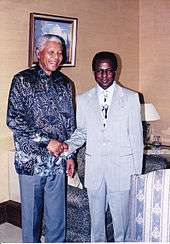
Dungia remains in Pretoria until January 20, 1998, when he is recalled to Kinshasa, according to Dungia, under the relentless pressure of Katanga nationals who constantly demand that President Kabila specifically appoints of an ambassador's native of Katanga to attract South Africans investments.
In July 1998 Dungia is appointed ambassador to Bangui, with jurisdiction over the Republic of Congo and Chad. He arrives in Bangui with his family, preceded by a stunt, he reports, organised by a Chargé d'affaires of the Democratic Republic of Congo who would maliciously use Centralafrican channels to send messages to President Patassé that Dungia is there to destabilise his power, as a member of the tribe of his rival and enemy André Kolingba. Once Laurent Kabila government is in operation in Kinshasa, the Chargé d'affaires would constantly send letters about Dungia to the Foreign Affairs Department which nobody seems to pay any attention to. Citing a lack of accreditation document as Ambassador of the DRC, Dungia returns to Kinshasa after two days in Chad as the Central African authorities refuse to receive him.
In 1999, Laurent Kabila decides that Dungia should return to South Africa, but the South African authorities do not respond to DRC’ request for the accreditation of its Ambassador.
Advisor to the Presidential Cabinet
May 9, 2000 the president Laurent-Désiré Kabila has him called in by Georges Leta, the deputy assistant chief of the National Intelligence Agency who Dungia had proposed previously to Kabila whilst in Pretoria for his appointment to this very position. Laurent Kabila himself suggests to Dungia that he makes the offer to Georges Leta because he had trouble finding a competent person. That day, therefore, Dungia is notified of the decision of Laurent Kabila on his appointment as his Special Adviser, Head of the Mission. But soon, Dungia tells, another political plot is mounted against him.
Deputy Foreign Minister David M'Bwankiem[10] would receive false information that Dungia is being prepared to take his post during an imminent cabinet reshuffle. The President's private secretary, Nelly Ntwite is her protector for the presidency. In return, she sends parents seeking work that David M'Bwakiem hastily sent in diplomatic diplomats already crowded with many years of unpaid wages. Very influential with the President Laurent Kabila, Nelly Ntwite distills the information assembled from scratch that Dungia is an antenna of Ngbaka rebel Jean-Pierre Bemba. Dungia is place under surveillance by Kabila until his assassination on January 16, 2001. External missions are no longer entrusted to Dungia. Moreover, the president goes as far as to refuse to grant him the authorization to make a private visit to Italy in December 2000.
Arrest and 2nd exile
On February 19, 2001, Dungia is arrested by the security department of the Presidential Guard on the grounds of being involved in a plot to overthrow the young new president Joseph Kabila. Eleven officers of the Armed Forces of the Democratic Republic of Congo (former Faz: Forces Armées Zaïroises) precede him on the list of detainees. February 23, they are transferred to the Makala prison.[11] The interrogations they are submitted to, are useless as there is no evidence to support the charges. Against all odds, inmates are transferred to the Buluwo prison in Katanga on June 17, 2001. On September 13, 2001, Dungia is “acquitted” by the Military Court which accelerates its judgments due to international pressure. His accuser, officer Itele Ituko[12] declares in the preparatory meetings that he has never seen Dungia in person. The latter returned to Kinshasa on September 16, 2001.
With the assistance of the Voice of the voiceless (Voix des sans-voix), one of the non-governmental organizations that had supported the cause of the prisoners unjustly accused until trial start, on September 25, 2001 Dungia attempts to organize a briefing on the irregularities which have marred the judicial proceedings in more than one way and how judgments were made outside the courtroom against his co-detainees. The event is prohibited under threat by the Military Court. Nevertheless, Dungia publishes the text of his statement in the paper La Tempête des Tropiques on September 28, 2001. The Congolese government tries to abduct him one night in the Protestant Center where he has settled with his wife upon his release from prison. In April 2002, he fled with his wife to Brazzaville.
Career under Joseph Kabila
.svg.png)
On July 21, 2003, Dungia returns to Kinshasa, followed by his wife on July 31. He returned to DRC at the invitation of Vice-President Azarias Ruberwa, president of the former rebel movement, the Congolese Rally for Democracy (Rassemblement Congolais pour la Démocratie). Dungia begins working in Azarias Ruberwa’ Cabinet on January 27, 2004.
In 2005, Emmanuel Dungia is appointed Ambassador to the European Union but he dies of cancer in hospital in Brussels before he can take office. Following his death, Dungia is replaced by Corneille Yambu-a-Ngoy[13] in August 2006.
Personal life

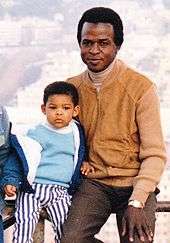
Education
In 1952, he starts primary school at the Catholic Mission of Bosobolo (Mission catholique de Bosobolo) where he reports having experienced a lot of trouble with the Italian Director, father Albert, who often gave him knocks on the head with a large bunch of keys.
As a young adult, to help his parents, Emmanuel Dungia decides to work for a moment before continuing his studies. Provincial Minister of Health Maurice Nyoka hires him as employee at the Advance for Home Funds (Maisons des Fonds d’avance) service, while his Chief of Staff Yapele already has his own candidate. For this reason, Dungia reported, it caused him so much trouble that it eventually persuaded him to resume his studies. So he enrolled at the University of Lovanium (université Lovanium), but another unpleasant surprise awaits him: the diploma of the scientific section A (Math-Physics) from the Athenaeum of Ngiri-Ngiri (Athénée de Ngiri-Ngiri) where he studied previously is not accredited by the Department of Education. He needs to go through a preparatory class called first. After this year, he is admitted in the Trade section of the Economics Faculty where he completes the year without any difficulty.
In 1967 following the situation created by the Belgian mercenary Schramme in Kisangani, a serious crisis erupts between the Congo and Belgium who withdraws its cooperative development staff. Mobutu decrees the mobilization of Congolese university students to temporarily alleviate the situation. Meanwhile, Dungia is tutoring as professor of mathematics at the Lumumba Athenaeum (Athénée Lumumba) in the municipality of Limete in Kinshasa. Shortly after resuming studies in his second year at university, he obtained a scholarship from the European Common Market for to study commercial engineering. He is back in Belgium in January 1969, meanwhile enrollments at universities deadlines have already closed. In the fall of 1969-70, Dungia is admitted at the University of Leuven (université de Louvain). The academic year goes smoothly.
In 1977, he graduates from commercial and financial sciences at the Saint-Louise Higher Institute of Commerce (Institut supérieur de Commerce Saint-Louis) in Brussels.
Family Life
Emmanuel Dungia is the father of 4 children.
In 1998 Dungia married for the second time but his wife will be struck death by sudden illness in November 2004 few months after their return from Brazzaville.
Health and Death
During his stay in South Africa between 1997 and 1998 Dungia was diagnosed with cancer that might have developed as early as 1995. It was thought to be a benign cancer that could be treated successfully. Without treatment he was expected to live only another 5 years.
Dungia had aversion, if not an extreme fright of hospitals and especially surgical rooms, and could not stand the sight of blood. He fails to follow his treatment as advised because he said that he does not “suffer”. He continues to pursue his life almost as if nothing had happened until 2005 when he is forced to return to Brussels for medical care that proves unsuccessful. He dies on February 1, 2006 a few days after the arrival of his daughters who travelled to Brussels after learning of their father's condition from their family living in Brussels. On his hospital bed Dungia tells his close friend that he is ready to “return” to his Maker on January 31 at the latest because he says he is happy to have seen the next generation: his granddaughter. He announces that he is only waiting for the arrival of his daughters from South Africa to “leave.”
Notes and references
- ↑ “Life and Death in The Congo”, Council on Foreign Relations, Thomas M. Callaghy, Council on Foreign Relations
- ↑ « Congo Les procès de Likasi Sept condamnés à mort », Colette Braeckman, 19 septembre 2001
- ↑ Royal Military Academy of Belgium
- ↑ “Mobutu's men live the high life in SA”, Sunday Times
- ↑ “Zaire: IRIN Briefing Part III, 02/27/97”, United Nations, Department of Humanitarian Affairs
- ↑ “Mushobekwa Kalimba Wa Katana”
- ↑ « Publications by Emmanuel Dungia », WorldCat library catalog
- ↑ “Congolese mourn assassinated leader”, St-Augustine.com, January 22, 2001
- ↑ “DRC: Rebels formally announce new movement, leadership e: bulk”, University of Pennsylvania - African Studies Center, 17th August 1998
- ↑ “International Court of Justice, Application instituting proceedings, filed in the Registry of the Court on 23 June 1999, DEMOCRATIC REPUBLIC OF THE CONGO v. UGANDA)”
- ↑ “Torture continues in Congo's prisons”, BBC News, 19 September 2001
- ↑ “DEMOCRATIC REPUBLIC OF CONGO, Torture: a weapon of war against unarmed civilians”, Amnesty International, June 24, 2001
- ↑ “Credentials - Congo, The Democratic Republic of the”
External links
![]() Media related to Emmanuel Dungia at Wikimedia Commons
Media related to Emmanuel Dungia at Wikimedia Commons